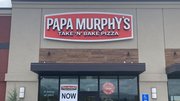Article
Can Your Pizza Business Survive an Audit?
Christmas is coming, but if you're a pizza operator or a tipped employee who hasn't recorded his income correctly in 2003, you'd better watch out—for the IRS.
December 9, 2003
The end of the tax year is nigh.
Are your books in order?
Could you survive an audit should the Internal Revenue Service (IRS) come calling?
According to IRS records, a lot of pizza operators probably couldn't. Some know it, don't care and will take their chances. Others don't know it and won't discover their errors until the taxman sends a bill.
About a decade ago, IRS agents in Providence, R.I., suspected the area's independent pizza operators weren't giving the government its tax revenue due. Income statements filed by many operators appeared suspiciously low for what appeared to be busy businesses.
In 1995, an investigation of Providence's pizza operators was launched, and "Market Segment Specialization Program: Pizza Restaurant," a report detailing the IRS's findings, explained the startling tale. Agents uncovered widespread illegal bookkeeping and cash skimming in many of the town's operations. On average, $700 each week was flowing from the tills to the pockets of the area's pizzeria owners.
Pizza particularly, but not solely
Were the IRS agents in Providence picking on pizza operators?
Sort of, but not really, said Sherri L. Currid, senior tax specialist with the IRS office in Springfield, N.J. Similar bookkeeping fraud in other independent restaurants (financial reporting and record-keeping systems in chain restaurants tend to be better established than in independent operations) is common as well. But since the bulk of pizza purchases in the U.S. are made with cash, fraudulent record keeping is not only more tempting, but more difficult for authorities to track.
"Few pizzerias take credit cards, but most restaurants have taken credit cards since they've been out," said Currid, who participated in a similar large-scale audit of New Jersey's pizza operators a few years ago.
The most important result of "MSSP: Pizza Restaurant" was auditors' establishment of methods by which they could reconstruct an operators' food, beverage and supplies purchases, and then calculate a taxable gross sales estimate. Tom Kohler, owner of Premier Accounting Services, a Louisville, Ky.-based bookkeeping service for restaurant chains, said the IRS agents who established the government's case against Providence operators were clever detectives. By asking operational questions rather than bookkeeping questions, the auditors were able to make highly educated guesses as to how much raw product each operator had purchased.
"They asked 'How many ounces of cheese do you use on a 14-inch pizza? How many pieces of pepperoni? How much sauce?' " said Kohler, a former CFO of Rally's Hamburgers. "They figured out what went into their most popular pizzas."
With such detailed information, the agents then called the operators' purveyors and acquired each operator's purchasing records. Using their new knowledge of each operator's ingredient usage, the agents figured out how many pizzas might have been made from those raw materials and developed sales and profit estimates.
Employee or contractor?
Not only were many Providence pizza operators skimming cash from their registers, some of them had phantom staffs. To keep employment records clean, operators paid employees with cash.
Such side payment of staffers isn't unique to Providence pizzerias, however, especially in the case of delivery drivers. Some operators attempt to hire drivers as independent contractors to avoid reimbursing them for auto use or having to pay their FICA and Social Security taxes.
The difference between an employee and independent contractor, however, is much clearer
|
Compensation control is a bit clearer: An independent contractor (delivery driver in this case) typically pays for all his job-related equipment, such as his car, and he's not reimbursed for related expenses, such as mileage or fuel. He also stands to make a profit or lose money based on how he runs his "service," and he's responsible for his own income records. In nearly all cases, he receives no benefits common to employment, such as health insurance or pension.
Tim Lockwood is a full-time delivery driver and independent contractor for a pizzeria near Nashville, Tenn. The pizza operator pays Lockwood $2 per delivery, and he and several other contractor drivers he works with make an unwritten working schedule themselves. Lockwood keeps his own records of tips and auto expenses and receives a form 1099-MISC from the operator at the end of each year.
"We literally are self-managing," said Lockwood. "We set our own schedules, we don't wear any uniforms or carry any signs on our cars."
Both drivers and employers are responsible for knowing all that is entailed in a contract relationship, said Lockwood, who is the treasurer for the Association of Pizza Delivery Drivers (APDD). Typically, operators and contracts don't know it all, either, he said.
"You can't just say, 'Presto! You're a contractor.' You have to consult with an attorney and write up a contract," Lockwood said. "There are some particulars drivers need to know, too, such as the IRS requiring a beginning and ending date on that contract; it has to spell out things (both parties) can and can't do."
While it appears some operators list employees as contractors illegally, APDD President J.W. Callahan believes they're the exception rather than the norm.
"I believe most of them are operating in good faith when they do it, but they might not know they're not doing it legally," said Callahan, who works in Warner Robbins, Ga.
Currid agrees that many operators don't know the legal particulars, but she said ignorance isn't an excuse if the IRS pays a visit. "It's still the business owner's responsibility to be informed, and they can find so much on our Web site."
A tip: Be sure employees report them
Restaurant operators were outraged in 2002 when the U.S. Supreme Court ruled that operators could be held liable if their employees underreported their tips.
To operators' defense, APDD's Callahan said policing drivers' tip reporting is next to impossible since cash tips are received off premises. And though he reports all his tips,
|
"If a driver is hurt on the job, and he's reported just some of his tips, that's what his worker's compensation is going to be based on," said Callahan, in a separate interview in 2002. "And if his car breaks down and he wants a new one, what bank's going to give him any money when he's got so little proof he actually makes any?"
Paul Paz, a self-dubbed career waiter who also speaks on hospitality and service, said long-time tipped employees who don't report all their income jeopardize future major purchases, such as homes.
"The paper-trail created (by tip proper reporting) generates a financial profile that is crucial when applying for credit from banks, mortgage companies and even your local department stores," said Paz, a contributing columnist to PizzaMarketplace. Paz also said electronic record-keeping systems provide indisputable records of what tipped employees should be making, and that trying to beat those systems isn't wise. "Technology makes it much easier for the IRS to access your financial records, including your bank accounts."
Currid knows well how detrimental underreporting can be to a tipped employee's financial future. As a waitress rearing four children, her mother made a respectable living, but was never told to report her tips. "Now her four kids are supporting her because she only gets $352 a month in Social Security. There was a real lack of education on that back then."
Despite operators' claims that they can't force their employees to report all their tips, Currid said they can make them sign tip reporting agreement as a condition of employment. (Click here to see information on TRAC, EMTRAC and TRDA documents.)
To varying degrees, each agreement puts more onus on tipped employees to report accurately, and it reduces the chance an employer will be penalized for any discrepancies if the tipped employee is found liable.
"If the restaurateur doesn't have a TRAC agreement in place, we can impose up to 50 percent of a certain penalty," said Currid. "But if it's not the employer's fault, he would be liable for his portion of the employee's FICA ... which still can be huge if you've got a lot of employees."
Plenty of help available
Regardless of whether taxpayers like the IRS, the agency deserves credit for trying to inform them on how to comply. Not only is the IRS Web site loaded with documents explaining regulations for restaurant operation, local representatives will, by appointment, hold educational seminars for restaurant staffs. According to Currid, the IRS will even prepare tax returns for any U.S. taxpayer whose household income is $35,000 or less.
"They don't have to go to H&R Block and pay for this," she said. "They can get it prepared for free, electronically filed for free and direct-deposited into their bank accounts for free."
For operators who want to be sure they're compliant, Currid recommends taking bookkeeping courses and consulting with professionals who can make sure a business's affairs are in order.
For operators who can afford it, Kohler recommends hiring a professional who knows the restaurant industry, not just basic accounting.
"Your generic accountant doesn't think like these IRS auditors (in Providence) did when they came up with a procedure for these audits. Those guys really seemed to understand the pizza business," said Kohler. Most operators, he believes, don't understand bookkeeping and tax law well enough to protect themselves fully from an audit. "I think most operators consider (bookkeeping) in terms of cash that went into the bank, and cash that went out of the bank: money I put in, and bills I paid. That's not enough to cover everything."
 ChatGPT
ChatGPT Grok
Grok Perplexity
Perplexity Claude
Claude









